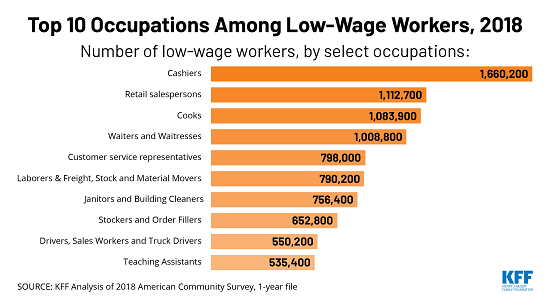
The independent source for health policy research, polling, and news.
COVID-19 Poses a Particular Threat to Low-Wage Workers’ Physical and Financial Health
The nation’s low-wage workers face a particular kind of bind.
They tend to work in service industries — such as the restaurant, hospitality and retail sectors – that are especially at risk for loss of income during the COVID-19 pandemic, or in jobs such as health care workers, grocery store workers and delivery drivers, where they may continue to work but face a higher risk of contracting the disease.
According to a new KFF analysis, over 25 million nonelderly adults worked in low-wage jobs in 2018, putting them among the bottom 20 percent of earners. Such workers will have limited ability to absorb income declines or afford health care costs, finds the analysis, which examines the characteristics of such workers and the implications of the pandemic for their jobs, health, and financial security.
Key findings of the analysis include:
- Most recent unemployment claim filings are for people who worked in service industries. Workers in these industries are disproportionately likely to be low-wage, with about a fifth of low-wage workers employed in each of the entertainment/accommodation/food services (20%) and retail (19%) industries, and another tenth in service (5%) or construction (5%).
- Many low-wage workers are engaged in positions that are likely involved with delivery of goods and services to people who remain at home under stay at home orders (e.g., laborers/freight, stock and material movers, stockers/order fillers, and drivers/truck drivers).
- 5 million low-wage workers are in the health and social services industry, with the greatest number of those (1.3 million) working as aides or personal care workers (e.g., nursing assistants or personal care aides) whose jobs will bring them into frequent, close contact with patients.
- A majority of low-wage workers are female (58% vs 47% of all workers), 57 percent are between the ages of 19 and 34, and a disproportionate share are Black and Hispanic.
- One in five low-wage workers lacked health coverage in 2018, and the share likely is higher now amid the economic downturn. Even before the pandemic, many low-wage workers reported problems affording needed health care. Nearly one in ten (9%) low-wage workers reports that they are in fair or poor health, possibly putting them at increased risk for serious illness if they contract COVID-19.
For the full analysis, as well as other data and analyses related to the COVID-19 pandemic, visit kff.org.
